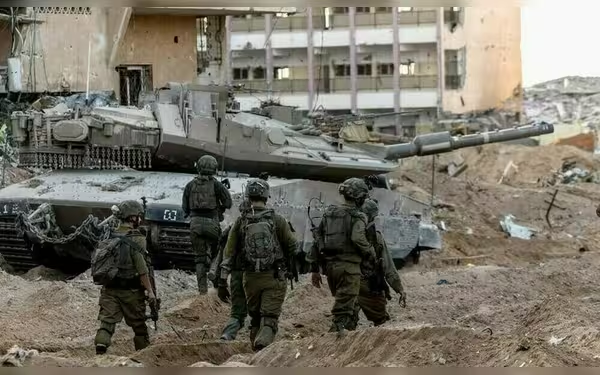Saturday, November 16, 2024 07:30 PM
Israel-Palestine Conflict: A Struggle for Autonomy and Justice
- Israel viewed as a 'death cult' by some critics.
- Historical context reveals ongoing imperialism in Palestine.
- Power dynamics shape the narrative of the conflict.
 Image Credits: brecorder
Image Credits: brecorderThe article explores the Israel-Palestine conflict, highlighting power dynamics and historical injustices affecting autonomy and justice.
The ongoing conflict in Palestine has sparked intense debate and discussion around the world. Many view Israel as a legitimate state, while others argue that it operates more like a "death cult" than a nation. This perspective raises critical questions about the nature of power, autonomy, and the historical context of the region.
Philosopher Herbert Marcuse once stated, "Elections of masters don’t change master-slave relations." This quote highlights the illusion of choice that often exists in political systems, where citizens are led to believe they have a say in their governance, while in reality, their options are limited to candidates who may not significantly differ from one another. This situation can create a false sense of freedom, masking the underlying issues of power dynamics and control.
Historically, the electoral process in the United States has demonstrated this farcical nature. For instance, during the 2000 elections, Al Gore won the popular vote but was ultimately sidelined in favor of George W. Bush due to a controversial Supreme Court decision. This incident exemplifies how the electoral system can be manipulated to serve the interests of a select few, rather than the collective will of the people.
In the context of international relations, the United States has often engaged in military actions under the guise of protecting democracy or responding to threats. The wars in Afghanistan and Iraq, justified by claims of weapons of mass destruction, have resulted in the loss of countless innocent lives. These actions reflect a broader pattern of using conflict as a means to address economic challenges, particularly in the face of over-accumulated capital and declining profit rates.
The situation in Ukraine further illustrates the complexities of modern warfare and economic interests. As the country grapples with territorial losses to Russia, it finds itself entangled with American multinational corporations and the military-industrial complex. This has transformed Ukraine from a "breadbasket" of Europe into a nation struggling to maintain its sovereignty and stability.
Turning to Palestine, the historical context reveals a long-standing struggle against imperialism and colonization. Under British rule, the establishment of a state was hindered, leading to a fragmented society. For centuries, Palestine thrived under Ottoman governance, characterized by peace and cultural exchange. However, the current state of Gaza, often referred to as the "world’s largest open-air prison," starkly contrasts this history, showcasing the dire consequences of ongoing conflict and oppression.
As we reflect on these issues, it is essential to recognize the broader implications of power dynamics and historical injustices. The plight of the Palestinian people serves as a reminder of the need for genuine autonomy and the importance of addressing the root causes of conflict. Understanding these complexities can foster empathy and encourage a more informed dialogue about the future of the region.
The narrative surrounding Israel and Palestine is not merely a tale of two nations but a reflection of deeper societal issues related to power, autonomy, and historical context. As we navigate these discussions, it is crucial to approach them with an open mind and a commitment to understanding the multifaceted nature of the conflict. Only then can we hope to contribute to a more just and peaceful resolution for all parties involved.













